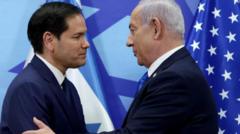As international opposition mounts against President Trump's plan to resettle Gaza's population, Israel's Prime Minister Netanyahu expresses commitment to realizing this vision with collaboration from U.S. officials. Tensions rise amidst ongoing violence, humanitarian crises, and contested legal actions.
Netanyahu Collaborates with Rubio on Controversial Gaza Strategy

Netanyahu Collaborates with Rubio on Controversial Gaza Strategy
Israeli Prime Minister Benjamin Netanyahu discusses collaboration with U.S. Secretary of State Marco Rubio following Trump's contentious proposal for Gaza's population resettlement.
Israeli Prime Minister Benjamin Netanyahu has reaffirmed his commitment to advancing U.S. President Donald Trump's controversial plan regarding the Gaza Strip. During a recent meeting with U.S. Secretary of State Marco Rubio in Jerusalem, Netanyahu discussed a "common strategy" aimed at making Trump's vision of removing and resettling Gaza's population a reality.
Trump's proposal, which has raised considerable alarm, suggests a takeover of Gaza and the relocation of its two million inhabitants to neighboring countries. Such forced displacement is deemed illegal under international law, with the UN explicitly labeling it as "ethnic cleansing."
Rubio stated that while Trump's plan might have shocked many, it shows "courage" to break away from traditional approaches. Both he and Netanyahu agreed that Hamas must be dismantled, rejecting its ability to govern or use violence as a means of negotiation. Speaking from the joint press conference, they outlined their shared goals, including undermining Hamas's control and countering Iranian influence in the region.
The violence that has engulfed Gaza since the escalation on October 7, 2023, has led to catastrophic humanitarian outcomes, with reports indicating that over 48,200 individuals have perished due to ongoing conflicts. Furthermore, close to 70% of infrastructure in Gaza has been damaged or destroyed, and numerous residents have faced repeated displacements amid severe shortages of essential resources.
Opposition to the U.S. takeover plan has unified Palestinian and Arab leaders; the Palestinian Authority and Hamas have both stressed that Palestinian territories are "not for sale." Notably, Rubio did not engage with Palestinian representatives during his trip, a marked departure from previous U.S. diplomatic practices.
In tandem with military discussions, Netanyahu condemned actions by the International Criminal Court (ICC), framing them as unjust attacks against Israel. Recent American military support, including the delivery of heavy bombs to Israel, signals continued U.S. backing for Israeli military operations.
As the situation in Gaza remains dire, with fluctuating ceasefire terms under scrutiny, the potential for further hostilities persists. Netanyahu's office has indicated plans for continued negotiations, pointing to the delicate nature of peace talks in the region. With the backdrop of humanitarian crises, international law implications, and a shifting political landscape, this collaboration between the U.S. and Israel will be crucial in shaping the future of Gaza.





















